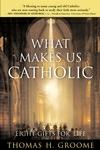 |
WHAT MAKES US CATHOLIC: EIGHT GIFTS FOR LIFE By Thomas H. Groome HarperSanFrancisco, 314 pages, $13.95 |
By THOMAS C. FOX
You’ve heard it time and again: “I’m not a particularly
religious person. I’m more into spirituality.” The problem with this
dichotomy, however, is that it misses the point of religion altogether. At its
core, religion is intended to lead people to an authentic and deeper spiritual
experience. Religion and spirituality go hand in hand, the former being the
communal setting for the latter.
Thomas Groome goes even further. In his latest book, What Makes Us Catholic, he argues that Catholicism does not have spirituality. Rather, it is spirituality. The sad part is that too often Catholic spirituality gets obscured by other aspects of the religion and in the process Catholic spirituality gets lost to seemingly dogmatic pronouncements, most often having to do with gender or sexual morality.
What gets tossed is the Catholic way of imagining reality and responding to the world with a profound sense of awe and responsibility. What gets rejected is a life-giving and life-inspiring approach to life. In his refreshing book, Groome attempts to rediscover Catholic life. He points to the rich metaphysical, cultural and social underpinnings that make up the spiritual Catholic journey.
Professor of theology and religious education at Boston College and the recently appointed director of the university’s Institute of Religious Education and Pastoral Ministry, Groome believes Catholic spirituality is the essence of the religion. It’s what makes a Catholic Catholic.
And what are some of the components of Catholic spirituality? He writes of Catholic optimism, a lust for life, the central place of gratitude, rich imagination, celebration and at the core, a sacramental view of life.
Not to be lost is a Catholic incarnational view of life, centered in Jesus, that makes all life sacred, demanding respect, even awe. Life, then, is to be lived in a sense of gratitude, awe and respect.
What might come as a shock to some is that Groome has virtually nothing to say about official church pronouncements on the usual sexual and gender-related taboos. They are simply not at the core of Catholic spirituality. What is at the core is God’s unconditional love. What is at the core is unconditional forgiveness. What is at the core are lives that are to be led basking in the glory of God.
To quote Groome, life is about “being lovers forever.”
Groome calls this a sacramental consciousness. It is seeing the sacred in all things, viewing God’s hand in every aspect of creation, “being alert to the more in the midst of the ordinary.” All of this is liberating, as religion is intended to be. To be a Catholic, then, is to live a life of spiritual liberation, a life essentially of the spirit. Groome’s book is an effort to get this spiritual message to a wider audience.
Tom Fox is NCR publisher. He can be reached at tfox@ncronline.org.
| God gives 'the right to celebrate' A few weeks back Tom Fox met with Thomas Groome at Boston College and posed a few questions. Tom Fox: Catholicism and spirituality? Why is Catholicism so optimistic? So we celebrate? It’s all a gift of God. So we can celebrate; we can dance; we can sing; we can have a drink. These are all gifts and are not evil. The notion that we’re not totally in charge, that God is ultimately God, gives us the right to celebrate. And sex is good, too, right? Catholic spirituality is not just a warm fuzzy either, right? And the core Catholic message? |
National Catholic Reporter, February 27, 2004